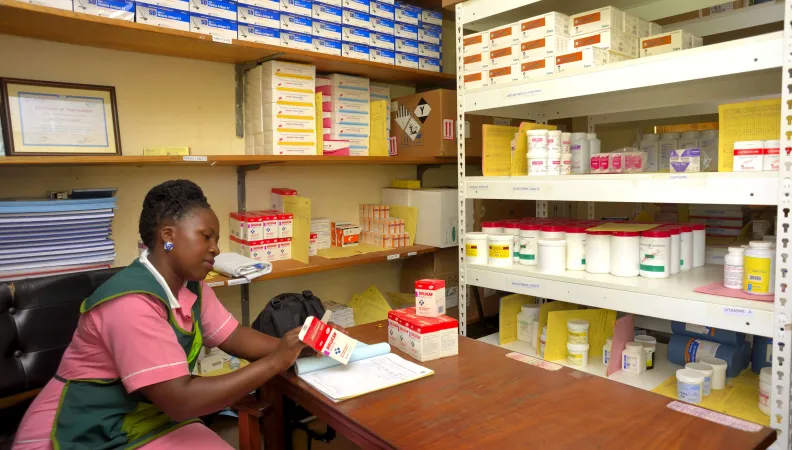Share the page
Global Gateway: 5 contributions to the EU strategy for international partnerships
Published on

Expertise France actively contributes to the group dynamics of Team Europe, whose “initiatives” have a lasting transformational effect in partner countries. On the occasion of the second edition of the Global Gateway Forum in Brussels, on 9 and 10 October 2025, find out about five examples of our contribution to the Global Gateway’s flagship programmes.
Digital sector: Building bridges between Europe and Latin America to accelerate digital innovation
The EU-LAC Digital Accelerator programme aims to strengthen strategic partnerships in the field of innovation by creating collaborations between start-ups and large companies in Europe and Latin America and the Caribbean. These partnerships foster economic development, increase local capacity and support innovative solutions in connection with the Sustainable Development Goals (SDGs).
Two examples of successful international partnerships between Europe and Latin America:
- TechSafe (Brazil-Portugal): A Brazilian start-up specialised in digital physiotherapy solutions has been connected with a Portuguese hospital to address needs for the prevention of musculoskeletal diseases. Through the support from the programme, TechSafe’s SaaS solution has been integrated into a new market, which has improved care and expanded the reach of its technologies
- Rubisco (France-Colombia): The French company Rubisco has worked with the Colombian subsidiary of L’Oréal to develop an innovative technology to analyse the durability of organic ingredients. This partnership has helped improve the composition of cosmetics, making the products greener and aligned with consumer expectations in terms of durability
The EU-LAC Digital Accelerator has launched its 4th open call for partnerships between European and Latin American-Caribbean companies and start-ups. Applications are open until 31 October.
For further information, consult the project website.
Climate: In Colombia, a “country dialogue” to support the “zero-deforestation” agreements
EUROCLIMA+, a flagship European Union programme in Latin America, aims to support climate change mitigation and adaptation through the country dialogue mechanism, which helps strengthen the implementation of Nationally Determined Contributions (NDCs).
In Colombia, this “country dialogue” action, implemented through the Ministry of Environment and Sustainable Development and the Ministry of Agriculture and Rural Development, aimed to strengthen the technical, financial and institutional aspects of the “zero-deforestation” agreements in Colombia, and help reduce the scourge of deforestation across the country by 2030. Find out more in this video:
Transport: Securing maritime routes
Expertise France works towards the EU strategy for maritime security. It is implementing several EU projects to strengthen national, regional and supra-regional cooperation for the protection of critical infrastructure and maritime security and safety. For example, the projects EnMAR in the Gulf of Guinea, ESIWA and CRIMARIO in the Indo-Pacific, and SEACOP in the Caribbean, West Africa and Latin America are helping to strengthen a dialogue and a common maritime culture between countries, enabling them to increase their maritime domain awareness.
Health: Structuring manufacturing and access to health products in Africa
Launched in 2021, the MAV+ Team Europe Initiative (TEI) aims to strengthen local manufacturing and access to vaccines, medicines and health technologies in Africa, in support of the African Union’s pharmaceutical sovereignty strategy.
Expertise France is supporting the members of the Team Europe Initiative by mobilising technical expertise in health. It handled over 100 requests for technical assistance in 2024, generating more than 90 deliverables for various European and African institutions.
Expertise France’s support through the technical component has strengthened the Platform for Harmonised African Health Manufacturing (PHAHM), with respect to pharmaceutical regulation and market access through its African Pooled Procurement Mechanism (APPM).
In addition, the coordination of EU activities has been strengthened through technical assistance to programmes that already exist or are being prepared. This has been achieved in collaboration with local stakeholders, European Union delegations, the Africa Centres for Disease Control and Prevention and the Medicines Regulatory Harmonisation initiative of the African Medicines Agency.
Education: Strengthening teacher training in Africa
Launched in 2024, the Regional Facility for Teachers in Africa aims to enhance learning outcomes and promote the socio-emotional development of children in Africa by contributing to the development of primary school teachers in terms of qualifications, motivation and inclusiveness.
To date, 17 countries have benefited from technical assistance to strengthen their education policies, improve their governance and advance the professional development of teachers.
To overcome teacher isolation, in 2025, the Regional Teachers Initiative for Africa (RTIA) organised 5 community of practice sessions for teacher training, gathering more than 180 officials and decision-makers from 23 countries.
In Kigoma, in Tanzania, 48 teachers from 12 secondary schools have come together to jointly prepare digital lesson plans. Through WhatsApp online communities, they share their ideas, support each other and strengthen their digital teaching practices.
